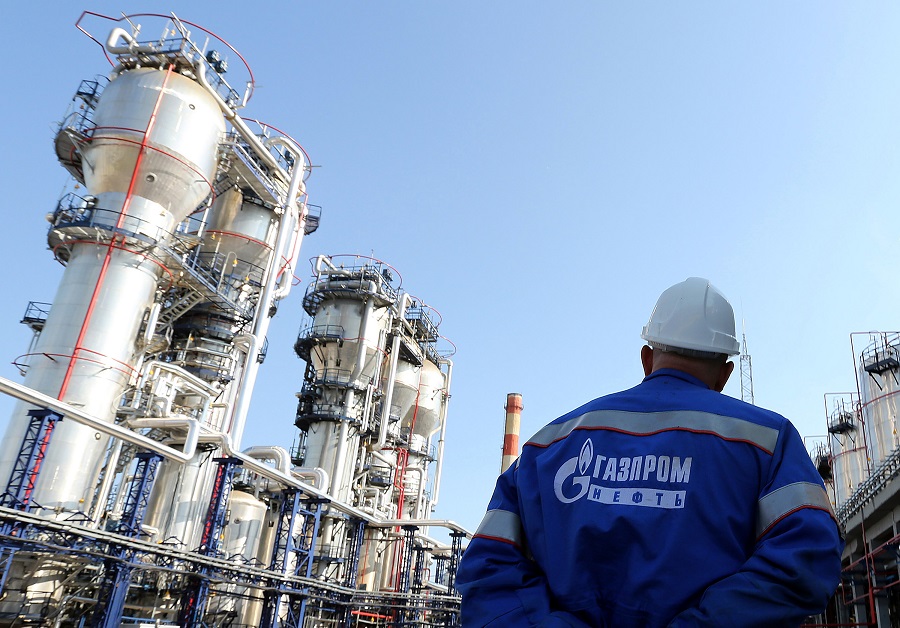Despite an abundance of hydrocarbon resources of its own, Russia will resume importing gas from its southern neighbor Turkmenistan, starting next year.
“By the end of the year, we are going to negotiate with our Turkmen colleagues to resume purchases of Turkmen gas,” Alexei Miller, the CEO of Russia’s largest gas company, the state-owned giant Gazprom, said on Tuesday. Miller was on a visit to Turkmenistan last week and gave an interview with the country’s state news agency.
“We know well the great opportunities of Turkmenistan, and at the same time, we see the growing markets to which gas is traditionally supplied. Therefore, the conjuncture today is very, very good,” Miller said, mentioning that the volume of deliveries and other technical issues between the two countries will be discussed in the near future.
Russia and Turkmenistan doing business in the natural gas sector is nothing new. In 2009, an agreement was signed whereby Gazprom agreed to purchase up to 30 billion cubic meters of gas annually at a price of almost $300 per 1,000 cubic meters. The agreement covered a period of 20 years.
But the situation changed dramatically in 2015, when the industry saw a steep drop in gas prices. Turkmenistan refused to revise the terms of the contract and sell its resources to Russia at a renegotiated rate, however, and the ensuing dispute made its way to the International Court of Arbitration, the world’s leading arbitral institution that exercises judicial supervision of arbitration proceedings.
Since January 1, 2016, Gazprom has stopped purchasing Turkmenistani gas. At the same time, Turkmenistan has occasionally suspended its gas exports to neighboring Iran, also due to pricing issues. Currently, China is the only major importer of gas from Turkmenistan, making the Caspian country highly vulnerable to a single customer.
The construction of a gas pipeline that links Turkmenistan and China through Uzbekistan and Kazakhstan was sponsored by Beijing. The terms of the agreement include the amount of money invested, which is to be taken into account when deciding on a price point and factor in Turkmenistan’s debt.
“The government of Turkmenistan gets about $60 per thousand cubic meters of gas from Beijing. Sure, the Russians will not pay much more, but the money is desperately needed as there is already a crisis, especially in the provinces [of the country],” said Serdar Aytakov, an Ashgabat-based expert, according to the Turkmenistani news outlet Gundogar.com.
Meanwhile, Miller’s visit to Turkmenistan followed a meeting between Presidents Putin and Berdymukhamedov in Aktau, Kazakhstan during the Caspian Summit and then in Sochi, Russia. Although what the presidents discussed has not been made public, experts believe that the sides agreed on the resumption of gas exports to Russia.
“As far as I understand, these talks followed the meeting of the presidents of Russia and Turkmenistan, at which Berdymukhamedov appealed to his Russian counterpart to consider resuming purchases of Turkmen gas by Gazprom,” said Alexei Grivach, Deputy Director of the Russia’s National Energy Security Foundation, according to reports by Eurasia Daily. “This is due to the deterioration of the economic situation in Turkmenistan,” he added.
While some see this as an entirely economic issue, others do not rule out Moscow’s political motives.
“With the decision to buy Turkmen gas, President Putin simply cancels the intention to build the Trans-Caspian pipeline and prevents the appearance of the third countries and regions in the Caspian,” said Serdar Aytakov.
The Trans-Caspian underwater gas pipeline, which would transport natural gas from Turkmenistan via Azerbaijan to Georgia and Turkey, and further west to Europe, was first announced in the United States in 1996. By February 1999, Turkmenistan's government signed an agreement with General Electric and Bechtel construction company to study the proposed pipeline route. Later that year Turkey, Georgia, Azerbaijan and Turkmenistan signed a series of agreements to make it happen, but due to the unresolved status of the Caspian Sea, the project was halted.
Earlier this year the status of the waters of the Caspian Sea was determined when the leaders of the five Caspian Sea littoral states – Azerbaijan, Iran, Kazakhstan, Russia and Turkmenistan – met in Aktau to sign the Convention on the Legal Status of the Caspian Sea.
According to the document, routes for the construction of pipelines under the Caspian’s waters are to be agreed upon by countries that own sectors through which these pipelines will be laid. At the same time, the countries can lay underwater main pipelines only if their projects comply with environmental requirements and standards specified in international treaties to which they are parties. An additional protocol to the Convention provides each of the five states with the right to participate in a comprehensive environmental impact assessment of marine activities that could potentially affect the natural environment of the Caspian Sea.







 Armenian sappers commenced on Monday mine-clearance operations in the territories adjacent to the Saint Mary Church in village of Voskepar (Armenia...
Armenian sappers commenced on Monday mine-clearance operations in the territories adjacent to the Saint Mary Church in village of Voskepar (Armenia...
 Russian Foreign Minister Sergei Lavrov has reasserted that Moscow has no intentions to stop the fighting in Ukraine, even if peace talks commence.
Russian Foreign Minister Sergei Lavrov has reasserted that Moscow has no intentions to stop the fighting in Ukraine, even if peace talks commence.
 Iran has refuted reports of alleged damage to Shimon Peres Negev Nuclear Research Centre located southeast of Dimona, Israel, during the recent air...
Iran has refuted reports of alleged damage to Shimon Peres Negev Nuclear Research Centre located southeast of Dimona, Israel, during the recent air...
 Iran and Pakistan have signed eight cooperation documents in various fields, and agreed to strengthen ties to fight terrorism in the region.
Iran and Pakistan have signed eight cooperation documents in various fields, and agreed to strengthen ties to fight terrorism in the region.



